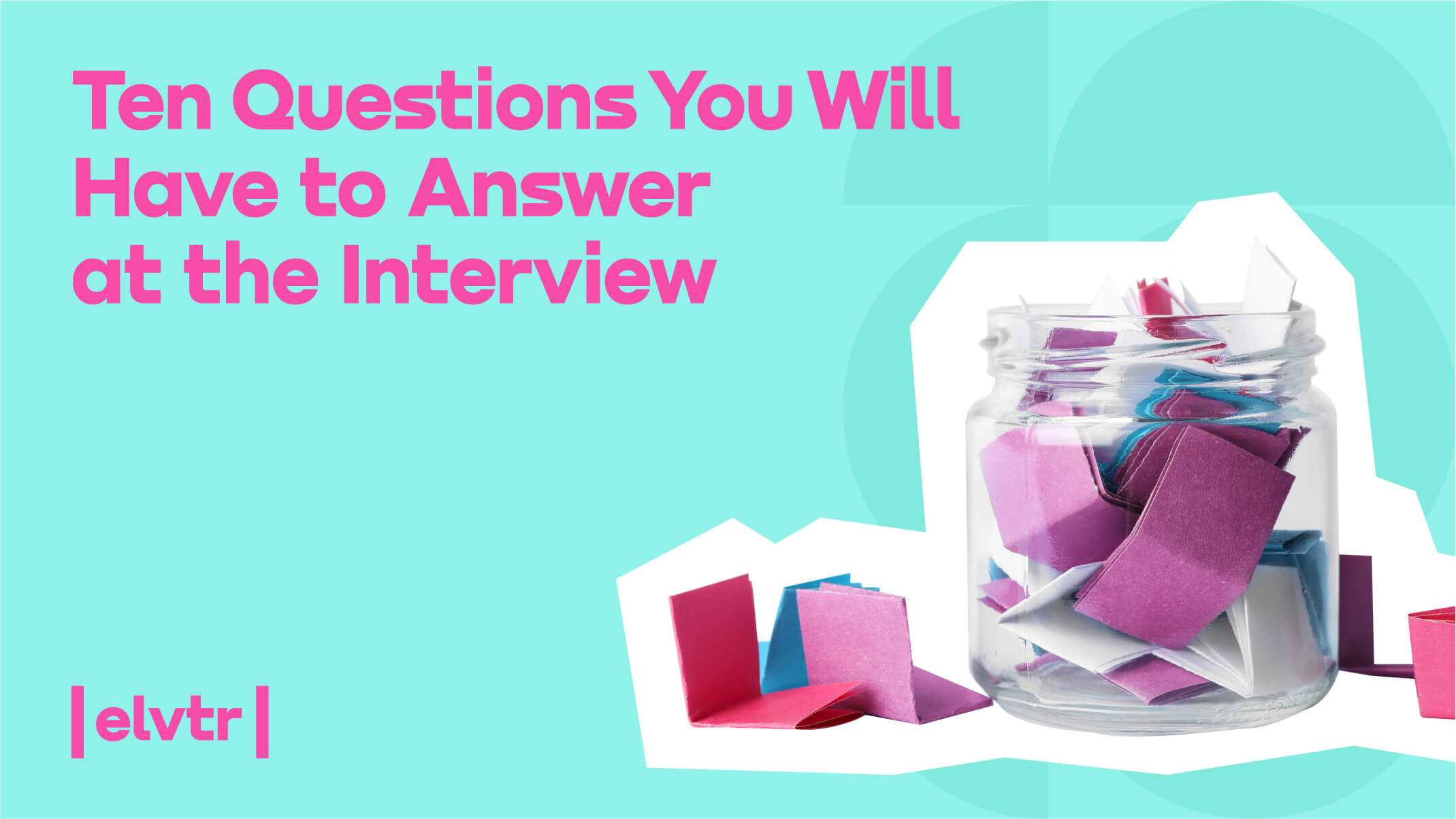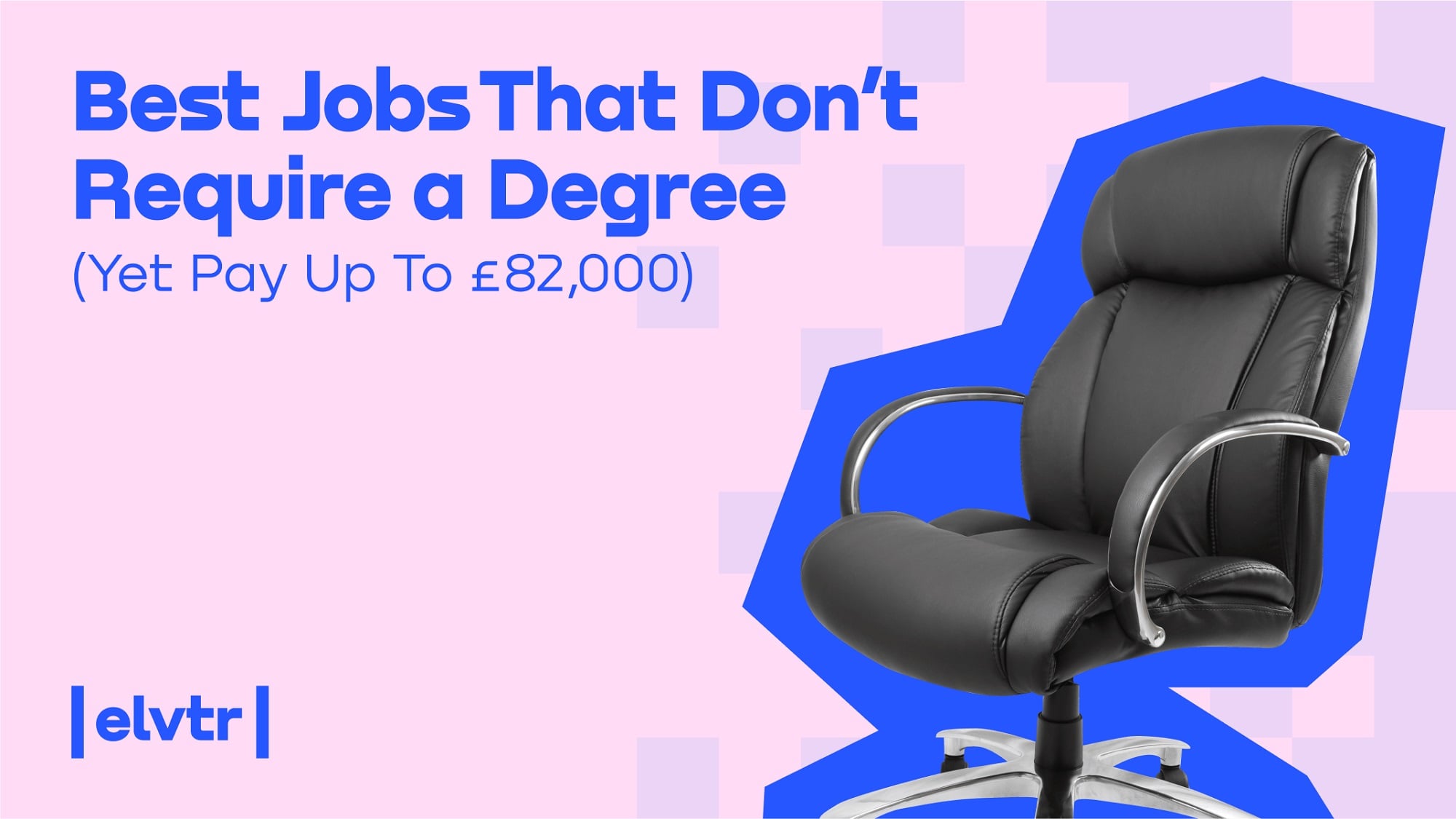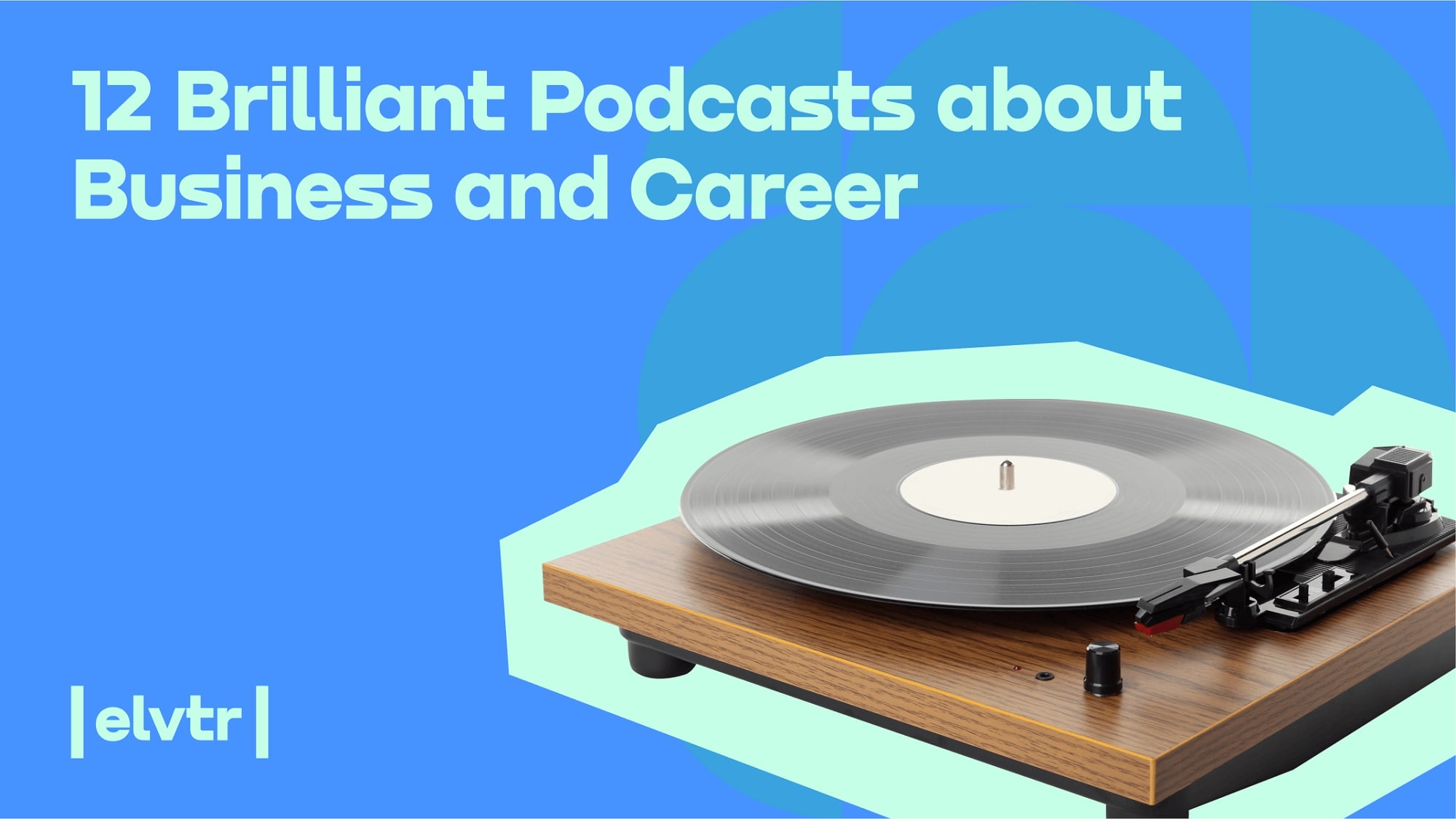- MAIN PAGE
- – elvtr magazine – Ways to prepare for them.
TEN QUESTIONS YOU WILL HAVE TO ANSWER AT THE INTERVIEW

At the interview, you will most likely have to tell about yourself and your strengths/weaknesses, explain why you decided to change your job, and voice your salary expectations. It would be better to prepare for such a conversation in advance to make a good impression.
We chose 10 key interview questions from The Balance Careers catalogue.
#1. "Please tell us about yourself"
Use the "present – past – future" pattern:
Start with what you are doing currently – professionally and in your spare time. Talk about hobbies that might show your strengths: for example, your love for chess indicates a high intelligence, and attending yoga classes indicates that you care about your health and know how to concentrate. If you know that you can come with pets to the company office, mention your dog during the conversation.
Then tell how you came to your current position. Be sure to tell about your education, courses, and trainings, previous work experience, participation in volunteer projects, etc.
Finally, mention your future plans. It will be a bonus if you can link your own goals with career opportunities in the company that invited you for an interview.
What not to do
- Do not make the interviewer squeeze information out of you. Otherwise, the recruiter might wonder why you came to the meeting at all, if you are limited to monosyllabic answers.
- Do not reveal all your cards at once. You still have a whole interview ahead of you.
- Do not share information which is way too personal, like about your family, children, partners, health, etc.
- Do not get too carried away when talking about your hobbies. The recruiter may decide that it is more important to you than work.
#2. "Please tell about your experience"
Focus on the skills you can apply to the position you are interested in. Tell about measurable successes and specific cases – for example, you arranged 5 conferences for 2,000 participants. Be ready to answer questions regarding any of the paragraphs in your CV.
You can use the STAR model to describe your experience:
S — Situation — what was the situation when you started working in this position?
T — Task/Target — what was your task or target?
A — Action Taken — what actions did you take to reach your goal?
R — Results achieved — what results have you achieved?
If you are limited by the NDA and do not have the right to name specific projects and numbers, try to describe the achievements as a percentage – for example, there was a 25% increase in users.
Start with the most recent experience – tell what you have been doing lately.
What not to do
- Don’t lie. It’s not difficult to check information about your professional experience. Even if you are hired, the deception might be revealed later. The scandalous dismissal of Yahoo CEO! proves that lying in the CV does not lead to anything good.
- Do not disclose confidential information when talking about your previous experiences.
- The recruiter has read your CV, so you do not need to list your job responsibilities for all the years of work.
YOU WOULD LIKE THIS ARTICLE:

Best Jobs That Don’t Require a Degree (Yet Pay Up to £82,000)
No degree? No problem.
#3. "What are your strengths?"
Prepare: select the requirements that you meet from the job description. It can be education, hard and soft skills, professional experience, etc.
Reduce the list to the 3-5 most important points. Describe how you have used that strength in the past next to each of them. The more your list looks like requirements for the position, the higher your chances of getting a job.
What not to do
- Do not be falsely modest. It would be best if you sold yourself profitably to the employer.
- Do not boast that you are better than others. ("I was the only one who did not make such mistakes", "Unlike the others, I quickly coped with challenges").
- Only talk about skills that are related to the vacancy. For example, if you are interviewing for an accountant position, there is no need to talk about the ability to arrange events.
#4. "What are your main weaknesses?"
Even if recruiters ask about your shortcomings, your answer should characterize you positively. Use one of the following three approaches to do this:
Little weaknesses. Indicate the shortcomings that are not important for your profession. For example, a copywriter may say he is not good with numbers. Then he mentions that he has loved everything related to the word since he was a child.
Skills you actively develop. For example, you can tell that you have always experienced stage fright and felt uncomfortable during performances. Though you took a course in public speaking and love presentations.
Weakness that might become a strength. Turn negative to positive. For example, admit that you are bad at multitasking. Though it means that you concentrate intensely on tasks and don't jump from one to another.
What not to do
- Do not arrange a self-blame session.
- Do not mention qualities that are important for this job as weaknesses.
- Do not say you don't have weaknesses.
- Do not say that perfectionism is your main weakness. In most cases it would sound insincerely.
Recommended courses
#5. "Why did you decide to change jobs?"
Instead of complaining about your previous employer, tell why you want to move on and develop in a new company.
Perhaps you are striving to solve more complex and responsible tasks, you are looking for unusual challenges, want to work on a different product, etc.
What not to do
- Do not criticize your former employer, colleagues, and clients. You will unlikely make a good impression if you complain and spread rumors.
- Do not disclose confidential information.
- Do not limit yourself to external reasons, such as looking for a job closer to your home.
#6. "Why do you want to work for us?"
In this case, the recruiter expects to find out how well you prepared for the interview. He might figure out whether you looked for information about the company, its culture, projects, partners, etc.
You can use the following template to prepare for a response:
"Working for your company will allow me to develop in ____ and _____. As far as I know, you value ____ and _____ in your company, and I would like to develop professionally in such an atmosphere. I would be particularly interested in working on [project title from portfolio]."
Be concise and specific. Show that you are familiar with the specifics of the company, and link your experience and values with the business demands.
Try to carefully study not only the potential employer’s website but also his social media, as well as publications in the mass media.
What not to do
- Do not focus on yourself. Your answer should focus on the company.
- Do not use general, vague phrases that could describe any organization in the market.
#7. "What motivates you?"
First, answer this question honestly to yourself. What are the situations when you feel a burst of energy? Is it when you hurry to the office? What do you tell your loved ones after work? It can be a successful meeting with a client, a complex project, employee training, or mastering a new skill. This might be everything that motivates you.
Think about how this relates to the job description and company culture. Here are some examples of motivators:
- tangible result
- work in a dedicated team
- complex tasks, challenges
- opportunity to learn new things
- recognition of merits
Be sure to give examples that support your words. Do not be afraid to show emotions. If you speak in a flat voice, you are unlikely to be able to convince anyone.
What not to do
- Do not deceive the recruiter (and yourself). If you are a lone wolf but assure that teamwork inspires you the most, you may be in the wrong place.
- Do not talk about negative motivation. It is usually based on fear. For example, "I strive to do a good job so that I don’t get fired."
#8. "What are your salary expectations?"
How not to lose money: not to ask for less than the employer is willing to pay, but do not overdo it? First, study the situation in the industry. Find out how much specialists in similar positions receive. Another option is to add 15-20% to your current salary so that the new job looks more attractive.
Here are some tips:
- Say that you are flexible in terms of salary and willing to negotiate terms. Lower salary might be balanced by a package of benefits or a bonus system.
- Remember that the salary may be lower on probation. Start discussions regarding salary increase in 3-6 months.
- Mention your strengths, for example: "Given my ten years of experience in the industry, I count on…"
- Be sure to discuss the same thing with the recruiter, i.e. the "net" amount, after tax.
- If, based on the interlocutor's reaction, you realized that you "went cheap", you can save the situation by saying, "I mean a fixed amount, without bonuses."
What not to do
- Do not rush to raise the question of money. A good practice is when the employer is the first to discuss the salary.
- Do not name the exact number. It would be better to indicate the range.
- Do not expect the employer to offer you a higher salary if you are modest. Keep your expectations high.
- Do not name numbers many times higher than the average on the market.
#9. "Why should we hire you?"
Consider what value you can bring to the company and back it up with examples. Answer following the pattern below:
- Tell what, in your opinion, the employer is looking for, and what issues he wants to solve.
- Describe your professional experience and skills that will help you solve these tasks.
- Use examples from the past to explain how you dealt with similar problems.
What not to do
- Do not enter into too extensive reflections. Your pitch should last 1-2 minutes.
- Do not tell how great you are. Better focus on the benefits you might bring to the company.
#10. "Do you have any questions?"
Now it's your turn to interview the employer. Prepare a list of topics that interest you in advance. Do not ask questions that have answers on the company website. Do not ask personal questions, do not overwhelm the interlocutor with too lengthy wordings.
Here are some examples of good questions to show you're interested:
- What a typical workweek looks like?
- What significant challenges will I face during the first three months if you hire me?
- How many people work in the department?
- Who will I report to in this position?
- Do you have an onboarding program?
- Why did this vacancy appear? Is this a new position, or did the employee quit/moved to another job?
What not to ask:
- What exactly does your company do?
- When can I take a vacation if I start working for your company?
- How soon will I get a chance to get promoted?
- Can I go home earlier as soon as I finish my work?
- Did I make a good impression? Are you hiring me?
*ELVTR is disrupting education by putting proven industry leaders in a virtual classroom with eager rising stars. ELVTR courses offer 100% instructor driven content designed to give you practical knowledge within a convenient time frame. Choose the right course for you!


